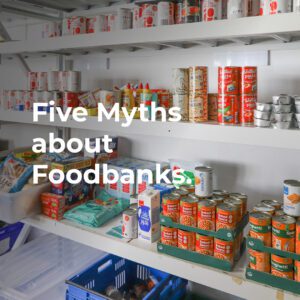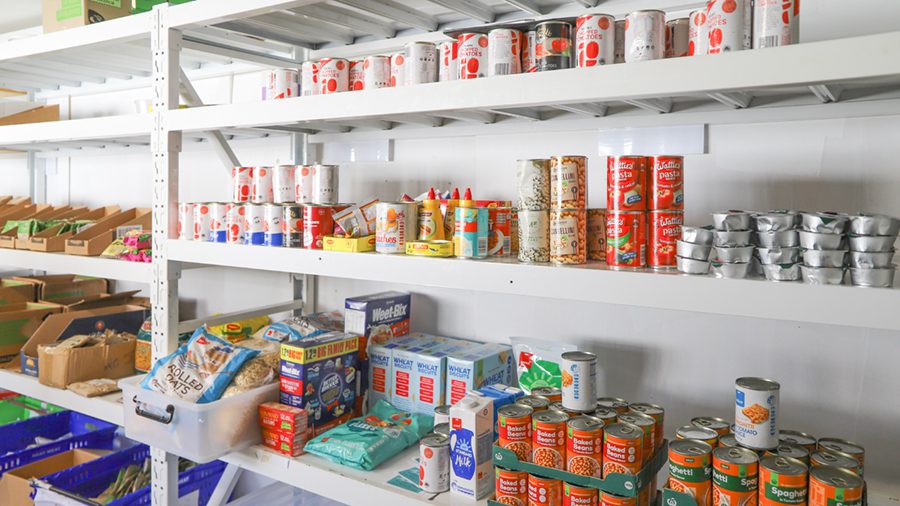As providers of food support in our local community, one question we’re frequently asked is, “Are foodbanks really necessary?” For some people the question is a legitimate request to understand the needs of others. For others the question hides an assumption that those asking for food support need to do so only because they are doing something wrong with their money.
This blog presents five myths about foodbanks and who’s asking for food support.
Food support at Visionwest
Whai Manaaki Kai is Visionwest’s food support service. It includes two initiatives to feed those in our community who are finding things financially tough.
Manaaki Kai is our social supermarket where people can shop for groceries at a fraction of normal retail prices. Last year, 2,544 individual shoppers accessed food from Manaaki Kai to feed themselves and their whānau.
Our Pātaka Kai provides emergency food parcels for those who are in need. Last year, the Pātaka Kai gave away 13,585 food parcels – that adds up to $1,970,140 worth of food (not including the social supermarket food).
Food support in West Auckland
There are around eight large foodbanks in West Auckland alone. With that amount of food support being provided every week it can lead to some questioning; especially by those who are in a financial position where food affordability is not an issue. Sadly, not everyone is in such a position. For some people, putting food on their table is a challenge. That challenge may be temporary, or it may, due to various factors, be an ongoing one. Here are five myths about foodbanks and about who uses them and why.
 Five myths about foodbanks and who’s asking for food support
Five myths about foodbanks and who’s asking for food support
♦ Foodbank Myth 1: Only homeless people use foodbanks.
Reality: While some of those who use Visionwest’s food support services are experiencing housing insecurity, others include individuals and families from all sorts of situations, some are working full-time. We also have a growing number of retirees.
What each of these people have in common is that they are struggling to make ends meet. It may be due to low wages, rising living costs, or unexpected expenses but, by receiving food support, they are able to free up money to pay for other living essentials.
♦ Foodbank Myth 2: People who use food banks are lazy or don’t want to work.
Reality: An increasing number of people facing food insecurity are employed but earn too little to cover all their basic needs. Illness, disability, or temporary financial hardships also drive people to seek support. For others, an unexpected expense when they are already on a tight budget can mean their week’s food money is swallowed up by some other expense.
Daniel and Lily’s story:
Both Daniel and Lilly work. When Lily fell pregnant with their second child, they had it all planned. They calculated that it would be fine for Lily to take six months maternity leave before returning to work. Unfortunately, the baby came prematurely. Both baby and mother were in hospital for a couple of months and on return home, required longer than the planned six months to return to full health. This threw the hardworking couple into a financial pickle.
Daniel managed to wrangle some extra hours at work but the combined outgoings of rent, power, vehicle expenses (they only have one car), insurances, food, and so on left them with a financial deficit each month.
In order to survive, they came to the Pātaka Kai at Visionwest for emergency food parcels and used the money saved to pay their power and other bills. They also received budgeting help from one of our financial mentors.
Once their financial crisis was over, Daniel and Lilly insisted on giving a donation to the Pātaka Kai so that others who might find themselves in a situation like theirs could also be helped.
♦ Foodbank Myth 3: People use food banks as a permanent crutch and will often waste the food they receive.
Reality: This has not been our experience at Visionwest. Most of those who come to Visionwest for food support come temporarily when facing crises like a job loss or an unexpected bill. Following focused support, most are restored to financial stability and no longer need assistance.
Of those who come, most feel a degree of embarrassment at being in the predicament they find themselves in and they work hard to make the food they receive go as far as possible. We provide recipes and other food related advice to help maximise the food they receive. Users of Whai Manaaki Kai are also often recommended to other Visionwest services that have the potential to help with their finances or other personal issues; in particular, Money Mentors, our financial mentoring service.
Mike and Dani’s story
Mike and Dani have been using the Visionwest Pātaka Kai for some time but are starting to get on top of their financial woes which began with Covid.
Mike has his own plumbing business and, at the time Covid hit, Dani handled the accounts for a local mechanic. They have three teenage children and their own home. During Covid, government restrictions meant Mike couldn’t work and Dani was receiving only the Covid wage subsidy before her boss, due to the downturn in work, had to terminate her employment.
Mike and Dani struggled. Paying the mortgage became impossible so they applied for and received a mortgage holiday. They cut back on all other spending as best they could but, with a drastically reduced income, could not afford to live. Their only answer was to do something they never thought they’d have to do – they went to a foodbank. Visionwest was eager to help and promised to supply food for as long as was needed for the family to get back on their feet.
It took a few years but they made it. They are now self-sufficient again but still talk about how the unbelievable happened to them – they never imagined that they would one day be lining up to receive emergency food parcels from a foodbank.
♦ Foodbank Myth 4: Food insecurity is just about food.
Reality: Food insecurity is not just about putting food on the table while everything else in life is going well. Being unable to afford food is invariably a symptom of broader financial challenges which can include unaffordable housing, medical expenses, a rising cost-of-living.
Most clients who come to Visionwest have the same regular expenses that all the rest of us have. Rent (or mortgage), power, water, vehicle expenses, insurances; the issue is not always about what’s being spent but about what’s not being.
In recognition of this, Visionwest provide a suite of wraparound social support services that people are able to access. One of these is our Money Mentors financial mentoring and budgeting service. Once a person has come for food a certain number of times, we recommend they meet with one of our financial mentors in order to provide help to manage their budget.
♦ Foodbank Myth 5: Foodbanks can solve hunger on their own.
Reality: Those of us who provide food support to communities recognise that it is a short-term relief measure and not a cure for systemic poverty. To reduce food insecurity requires a raft of structural changes like affordable housing, living wages, and access to social services. Foodbanks support and advocate for these changes, however, our immediate task is to put food on tables and ensure families are not starving in the meantime.
Vanesh’s story
Vanesh ran her own business for several years and thought she was pretty good with money. She made a good income and was never behind on paying her bills. Then, following a downturn in the economy and rapid rise in the cost of living, Vanesh’s clientele dropped away. Before long, as a solo mother, she was struggling to support herself and her two primary school aged children.
When a friend suggested she makes an appointment with Money Mentors, Visionwest’s financial mentoring and budgeting service, Vanesh was hesitant. She couldn’t believe her money could be stretched any further but, because she was slipping deeper and deeper into debt and was finding it difficult to even purchase food, she went along.
Vanesh was amazed when her financial mentor managed to not only help her balance her budget but also find some extra money to start paying off her debt. In order to do this, and to help her out of debt faster, Vanesh was recommended to Whai Manaaki Kai, Visionwest’s food support service. By saving on food costs for a short while, Vanesh was able to pay off her debt and other expenses and get on her feet far quicker than she’d imagined would be possible.
Conclusion
As these myths and client stories reveal, food insecurity is complex. It comes wrapped in financial struggles that are often beyond anyone’s control. An understanding of these myths, however, cannot help but engender and empathy and sense of support for those facing temporary or unexpected hardships. The stories of those who’ve received help reveal, not laziness or wastefulness but rather resilience, determination, and gratitude, alongside the deep sense of relief that comes from community support.
Sure, food support alone can’t solve poverty, but they provide a crucial lifeline in times of crisis. At Visionwest, we’re committed to standing beside our community whānau, helping them regain stability and dignity through both immediate assistance and long-term solutions.
++++
Find out more about Whai Manaaki Kai, Visionwest’s food support service.
